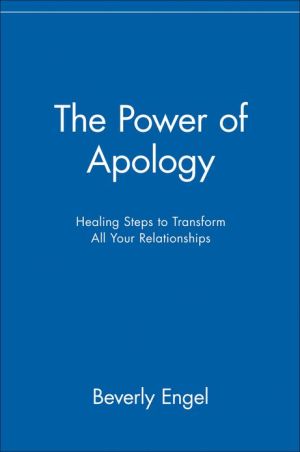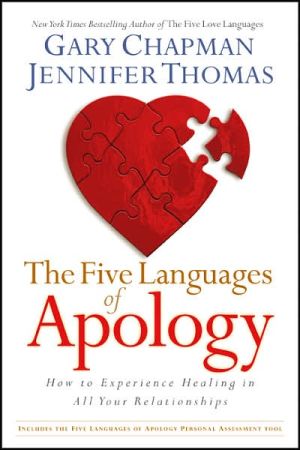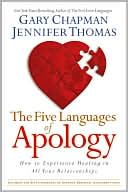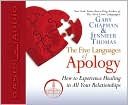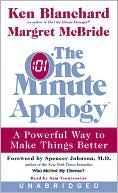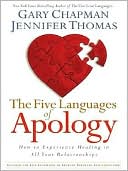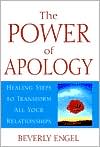Power of Apology: Healing Steps to Transform All Your Relationships
"Fresh and useful . . . excellent practical advice . . . thorough and lucid . . . will be welcomed by many who have struggled to ask forgiveness and to forgive."\ -Publishers Weekly\ A finalist in the Books for a Better Life Awards competition!\ Discover the healing power of apology and put its magic to work in your life\ Do you have a difficult time apologizing or are you involved with someone who does?\ Do you tend to overapologize and appear weak in others' eyes?\ Do you want to reconcile...
Search in google:
"Fresh and useful . . . excellent practical advice . . . thorough and lucid . . . will be welcomed by many who have struggled to ask forgiveness and to forgive."–Publishers WeeklyA finalist in the Books for a Better Life Awards competition!Discover the healing power of apology and put its magic to work in your lifeDo you have a difficult time apologizing or are you involved with someone who does?Do you tend to overapologize and appear weak in others’ eyes?Do you want to reconcile with someone but feel they owe you an apology first?Do you need to apologize or make amends to someone but don’t know how to go about it?In this inspiring book from internationally acclaimed therapist and self-improvement author Beverly Engel, you will learn why some people have difficulty apologizing while others tend to overapologize. You’ll learn how to give a meaningful apology, how to ask for one, and how to receive one. From making amends with those you have hurt to dealing with someone who refuses to apologize to teaching children responsibility and empathy, this life-changing book shows you how to bring a healing new element of renewal into every relationship in your life."Beverly Engel has eloquently explained the power of apology in a remarkably insightful and perceptive manner. No one has been better able to explain what an apology means and its role in reconciliation."–Rabbi Charles A. Klein, author of How to Forgive When You Can’t Forget: Healing Our Personal Relationships "Readers of this wise and lucid guide to the neglected art of authentic apology will acquire a powerful tool to help repair relationships with others and with themselves."–Jeanne Safer, Ph.D., author of Forgiving and Not Forgiving: A New Approach to Resolving Intimate Betrayal "An engaging and in-depth book on a subject that has rarely been addressed so intelligently and thoroughly. Ms. Engel offers the reader specific suggestions that can help you improve all your relationships."–Steven Farmer, M.F.T., author of Adult Children of Abusive Parents
The Power of Apology\ Healing Steps to Transform All Your Relationships \ \ By Beverly Engel \ John Wiley & Sons\ Copyright © 2002 Beverly Engel\ All right reserved. \ ISBN: 0471218928 \ \ \ \ \ Chapter One\ \ \ Apology Is for Everyone\ \ \ Apology is a lovely perfume; it can transform the clumsiest moment into a gracious gift.\ Margaret Lee Runbeck\ A clear conscience is more valuable than wealth.\ Filipino Proverb\ \ \ * * *\ \ \ THE POWER OF APOLOGY PRINCIPLE 1\ Apology, or the lack thereof, affects literally\ every single person on a daily basis.\ \ \ \ Apology changed my life. I believe it can change yours as well. Whether you have a difficult time apologizing to others when you have wronged them, difficulty receiving or accepting the apologies others have given you, or difficulty asking for the apologies that you feel are owed you, The Power of Apology will help you understand the obstacles that stand in your way and will offer you strategies to help work past them. It will also help you if you tend to overapologize or if you apologize automatically or too often, even if you haven't done anything wrong. Whether by force of habit, as a way to avoid conflicts, or as a symptom of low self-esteem, overapologizing can be just as troublesome as not apologizing often enough. It can affect how others perceive you, your image of yourself, and your status in a relationship or in your career.\ Don't underestimate the power apology has to affect and change your life. Even if you feel you have no issues with apology, I guarantee that you will change your mind after reading this book.\ But this book is about more than apology. The Power of Apology will teach you how to become a more humble, tolerant, compassionate, and empathetic human being. It will teach you to be less judgmental and critical of yourself and others. It will encourage you to focus on learning your own life lessons instead of thinking you can teach others their lessons. It will teach you how to conduct a life review and how to go about making amends to those you have harmed in the past. And it will help you with your issues with forgiveness, including when it is best to forgive and when it is best not to forgive.\ The Power of Apology is about bringing families and friends back together when they have been estranged, as well as bringing couples and families closer together on a daily basis. It is about teaching our children to take responsibility for their actions and to have empathy and compassion for others. Ultimately, it is about saving your soul and the souls of those you love.\ \ \ The Healing Power of Apology\ \ \ Apology has the power to heal individuals, couples, and families. Almost like magic, apology can mend our relationships, soothe our wounds and hurt pride, and heal our broken heart.\ When we apologize to someone we have hurt, disappointed, neglected, or betrayed, we give them a wonderful gift that is far more healing than almost anything else we can give. By apologizing we let the other person know that we regret having hurt him or her. Just as important, we let this person know we respect him and we care about his feelings. It becomes one of the most effective tools for mending a relationship.\ Apology is not just something we do to be polite. It is an important social ritual, a way of showing respect and empathy for the wronged person. It is also a way of acknowledging an act that can't go unnoticed without compromising the relationship. Apology has the ability to disarm the anger of others, to prevent further misunderstandings, and to bridge the distances between people.\ But apology has more than the power to soothe wounds or mend relationships. In some instances, it even has the ability to rehabilitate an individual, resolve conflicts, and restore social harmony. While an apology cannot truly undo harmful effects of past actions, paradoxically, if done sincerely and effectively, this is in fact what apology manages to do. When an apology is received as the gift that it is and reciprocated by the gift of forgiveness, it is nothing short of a miracle.\ Apology is also an important factor in creating and maintaining healthy relationships. When we apologize to those we've hurt, slighted, disappointed, betrayed, or angered, the caring and respect we convey through our apology fosters love and trust.\ When someone does something that hurts our feelings but does not apologize for it, we become resentful of that person. This resentment can take the form of our distancing ourselves from her, expressing our anger in numerous direct or indirect ways, or feeling less motivated to be considerate or caring toward her.\ When your own behavior is offensive, inconsiderate, or hurtful, the recipient of your behavior grows wary of you. Whether he realizes it consciously, he feels he must be on guard. He no longer feels as relaxed around you and may even feel that he can no longer trust you. If an apology is not forthcoming, this wariness and distrust will grow. It's one thing to hurt another person, but it's another thing entirely to either not be aware that you have hurt him or to not care. If this occurs at the beginning of a relationship, it may influence whether the relationship continues. If the relationship is already an established one, it may add to a growing sense of alienation and resentment.\ Apologizing to another person is one of the healthiest, most positive actions we can ever take--for ourselves, the other person, and the relationship. Apology is crucial to our mental and physical health and well-being. Research shows that receiving an apology has an obvious and positive effect on the body.\ The act of apology is not only beneficial to the person receiving it but to the one giving it as well. The debilitating effects of the remorse and shame we can feel when we've hurt another person can eat away at us until we become emotionally and physically ill. By apologizing and taking responsibility for our actions, we help rid ourselves of esteem-robbing shame and guilt.\ \ \ The Exchange of Shame and Power\ \ \ According to psychiatrist Aaron Lazare, in an article in Psychology Today, what makes an apology work is the exchange of shame and power between the wrongdoer and the person who has been wronged. By apologizing, you take the shame of your offense and redirect it to yourself. You admit to hurting or diminishing someone, and, in effect, say that you are really the one who is diminished--that is, "I'm the one who was wrong, mistaken, insensitive, or stupid." In acknowledging your shame, you give the person who has been wronged the power to forgive. The exchange is at the heart of the healing process.\ Apology has the power to humble the most arrogant of people. When we are able to develop the courage to admit when we are wrong and to work past our fears and resistance to apologizing, we develop a deep sense of self-respect. This self-respect can, in turn, affect our self-esteem, our self-confidence, and our overall outlook on life. When I apologize to you, I show you that I respect you and care about your feelings. I let you know that I did not intend to hurt you and that it is my intention to treat you fairly in the future. By accepting my apology, you not only show me (and yourself) that you have a generous spirit but that you are giving me and our relationship another chance. In addition, you are reminded of your own mistakes, which can encourage you to treat me and others with more respect and consideration.\ Apology has the power to make all our relationships, whether personal or business, far more respectful, caring, and compassionate. If done correctly, an apology can heal humiliation and foster reconciliation and forgiveness. A genuine apology given and then accepted is one of the most profound interactions between civilized people.\ \ \ My Story\ \ \ When I was 35 years old, I divorced my mother. I felt that it was the only thing I could do. Not only had my mother severely damaged me with her emotional abuse as I was growing up, but she continued to emotionally abuse me every time I saw or spoke to her. I became so emotionally and physically stressed when I was with her that my health was affected. And so I made the difficult yet necessary decision to stop seeing her.\ This estrangement went on for 3 years. During this time I wrote a book entitled Divorcing a Parent, in which I told my story about divorcing my mother and encouraged others in similar situations to consider doing the same. Then one day the phone rang, and when I picked it up the person on the other end of the line said, "I'm sorry." I recognized the voice. It was my mother.\ Waves of relief washed over me. Resentment, pain, fear, and anger drained out of me. Much to my surprise, those two simple words seemed to wipe away years of pain and anger. They were the words I had been waiting to hear most of my life.\ I knew that it had taken all the courage my extremely proud mother could muster to say those two words and so I didn't belabor the point at the time. The important thing was that she was saying she was sorry--something she'd never done before. I could tell by the tone of her voice that she truly regretted the way she had treated me and that she was deeply sorry.\ Of course, that was only the beginning of the story. Although I believed her apology, I didn't yet know that her behavior toward me was going to be different. This I tested out slowly and carefully over several visits. But I soon realized that a miracle had occurred. My mother was a changed woman.\ The years we were apart had caused her to do some serious thinking about herself and her behavior, yet this was only part of the answer. My mother had also stumbled onto another book I had written during our time apart, The Emotionally Abused Woman, at her local bookstore. In it I describe in detail the different types of emotionally abusive behavior, and she had recognized that she had been abusive to me.\ It had taken a lot for my mother to get to the place where she could say "I'm sorry." I had to completely sever my relationship with her. It had taken years of soul-searching on her part. Finally, it had taken a miracle. I hadn't told my mother about The Emotionally Abused Woman. She seldom went into bookstores, and when she did she always went to the mystery section. The self-help or recovery sections would be the last places she'd ever go under normal circumstances. Even after recognizing her own behavior, it took all the courage she could muster to put aside her pride long enough to apologize.\ My mother lived only 3 more years. But because she was able to apologize and because I was able to accept her apology, we were closer in those 3 years than we had ever been, and our time together was extremely healing for both of us.\ \ \ Apology Is for Everyone\ \ \ The Power of Apology is not just for adult children and their parents, those who have been deeply harmed by someone, or those who owe an apology for past deeds. It is for everyone. Apology, or the lack thereof, affects literally every single person on a daily basis.\ Everyone has issues with apology to some degree or another. Some people focus on the apologies owed them--harboring their anger or lamenting about how things would be different if an apology were given. Others focus on the apologies they need to make, feeling angry or disgusted with themselves because they can't seem to find the wherewithall to apologize, or feeling hopeless because they no longer have contact with those they've hurt. And while many have difficulties apologizing, many others, particularly women, tend to take responsibility and to apologize too often.\ If you have difficulties apologizing, this book will help you understand why making an apology is hard for you, will help you get past your resistance, and will teach you the most effective way to apologize. For those who have attempted apologizing in the past but have not been able to do so successfully, I will teach you how to make meaningful apologies--apologies that will be heard and believed. For those who yearn to restore a shattered relationship, I will answer such questions as (1) What do I have to do to show how sorry I am? (2) What will it take to bring us back together? (3) How can I take a person back into my life who has betrayed me?\ If the people who have hurt or harmed you have not apologized, causing you to harbor anger and resentment and getting in the way of your being able to forgive, this book will help you in two ways: (1) It will show you ways to elicit apologies that might not otherwise be forthcoming. (2) It will help you to forgive even if you never receive an apology.\ \ \ Giving, Receiving, and Asking for Apologies\ \ \ For many people, receiving and accepting an apology is more difficult than giving one. This is particularly true for many women. Instead of graciously accepting apologies, women often push them away by minimizing the offense or by taking some or most of the responsibility for the offense themselves. Think of how many times you've heard a woman (or done so yourself) insist that something was merely a misunderstanding instead of allowing the other person to take full responsibility for a transgression. Accepting an apology, even when it is sincere and heartfelt, can also be difficult if you are blinded by rage or licking your wounds from the last altercation.\ Learning how to ask for an apology can be as important as learning how to give one. Many of us simply distance ourselves from those who fail to apologize to us. We write the person off or feel that it is no longer safe to be vulnerable with him or her. But by asking for an apology, we can begin to bridge the gap that has grown between us. We let the other person know that we were hurt and we give him or her another chance.\ By learning how to give, receive, accept, and ask for meaningful apologies, your life and your relationships will be transformed. Instead of adamantly denying wrongdoing and alienating those around you, you will be better able to admit when you are wrong and garner the respect of others. Instead of pushing away well-intentioned apologies or making excuses for wrongdoers, you'll be able to take apologies in and receive the healing that can come from them. And instead of silently seething with anger when someone hurts you, you'll be able to tell the wrongdoer why you were hurt and will be far more likely to receive the apology you deserve.\ \ \ Apology and the Forgiveness Craze\ \ \ Apology is an important element that seems to be missing in the current forgiveness craze. Forgiveness has become the cure-all for our problems. Many daytime talk shows have changed from anger fests to forgiveness fests as parents are reunited with their estranged children, as spouses are forgiven for their betrayal, and as politicians or leaders stand up and ask for forgiveness. We are told that forgiveness alleviates depression, enhances self-esteem, and erases past pain. Failure to forgive, we are warned, can doom us to be a victim for the rest of our life.\ I was shocked to see just how far some people will go in their efforts to push forgiveness onto others when shortly after the Littleton, Colorado, shootings a reporter stuck a microphone in the face of a grieving parent and asked, "Have you forgiven your child's murderers?" I was even more shocked when I heard the parent say, "Yes." Forgiveness is far more difficult and complex than most people understand. It is a process that takes time and dedication. Most importantly, the giving and receiving of meaningful apologies is often required before true forgiveness can occur. It is painfully difficult, if not impossible, for those who have been hurt to forgive if a meaningful apology is not forthcoming. And it is equally difficult to forgive yourself when you don't have the strength to apologize to those you've hurt.\ \ \ The Need for an Apology in Order to Forgive\ \ \ There is no doubt that we should be able to forgive. But we can't always do so. Many people are unable to forgive, no matter how hard they try. Apology is the missing key.\ Think of an incident when you felt wronged by another person. What did you want from that person in order to forgive him or her? Most people say they want an apology. But why is this the case? It isn't just the words I'm sorry that we need to hear. We need the wrongdoer to take responsibility for his or her actions and we need to know that the wrongdoer feels regret or remorse for having harmed us. This expression of responsibility and remorse helps us to gain compassion and empathy for the offender--which are both necessary if we are going to be able to forgive.\ \ \ The Exercises\ \ \ Throughout the book I offer information and personal stories (my own and those of clients and friends) that will help you come to a deeper understanding of the importance of apology and encourage you to make apology an integral part of your life. In addition, I offer exercises that will help you resolve your issues with apology, whether you have difficulty apologizing, accepting apologies, or asking for apologies. Please don't underestimate the importance of these exercises. While it may be a natural urge to want to skip the exercises in your enthusiasm to move forward in the book, you'll gain much more from the book if you take the time to complete each one.\ Since I can't work with each one of you in person, my exercises are the next best thing to working with me in therapy. And it has been my experience that those who pause to complete the exercises in my books experience many more profound changes in their life than those who do not.\ \ \ EXERCISE\ Your Apology Lists\ \ \ This first writing exercise will help you begin the process of discovering your issues with apology.\ A. Make a list of all the people to whom you feel you owe an apology. Write down whoever comes to mind. Don't worry about whether your list is complete (we'll work on helping you make a more complete list later in the book).\ 1. Write about what you noticed or learned from making this list. For example:\ * Do you have a lot of people to apologize to or a few?\ * Do you have difficulty thinking about apologizing?\ * Does your pride get in the way?\ * Did you notice yourself feeling stubborn and a need to be right?\ * Were you too busy thinking about what the other person did to you to think about apologizing to him or her?\ 2. Write about who you feel most inclined to apologize to and why. For example, does it seem easier to apologize to those to whom you are closest (such as your partner, your family, or your close friends) or to those to whom you are more distant (such as business associates or acquaintances)?\ 3. To whom do you feel most resistant to making an apology? Write about why you think this is the case.\ B. Now make a list of all the people who you feel owe you an apology.\ 1. Write about what you noticed or learned from making this list. For example:\ * Are there a lot of people who owe you an apology?\ * Does it make you uncomfortable thinking about asking these people for an apology?\ * Do you think you have the courage to ask for the apologies you feel are owed you?\ * Why have you not asked for an apology for these offenses before now?\ 2. Write about who you feel most inclined to ask for an apology and why. For example, does it seem easier to ask those to whom you are closest or those to whom you are more distant?\ 3. To whom do you feel most resistant to asking for an apology? Write about why you think this is the case.\ \ \ * * *\ \ \ We all have plenty to apologize for. Every single day we do things that hurt other people's feelings or that show disrespect. We're impatient and rude to store clerks; we snap at our co-workers; we become defensive and argue unnecessarily with our friends; we say hurtful things to our partner in the heat of an argument; we misjudge a friend's intentions when he or she tries to help us; we falsely accuse our children of lying.\ Even when we are aware that we have hurt another's feelings and feel a twinge of remorse, most of us let these moments pass without apologizing. We tell ourselves that it isn't all that important--they'll get over it. We rationalize that the other person has done the same thing to us. We may even tell ourselves that we'll apologize later but then forget to do so.\ Unfortunately, apology has gone the way of many other social gestures that convey respect and consideration for others (such as "please" and "excuse me"). One of the many goals of this book is to help bring back this gesture of respect and caring, perhaps encouraging everyone once again to begin saying other important words as well.\ \ \ Continues... \ \ \ \ Excerpted from The Power of Apology by Beverly Engel Copyright © 2002 by Beverly Engel. Excerpted by permission.\ All rights reserved. No part of this excerpt may be reproduced or reprinted without permission in writing from the publisher.\ Excerpts are provided by Dial-A-Book Inc. solely for the personal use of visitors to this web site. \ \
AcknowledgmentsxiIntroduction1Part 1The Power of Apology9Chapter 1Apology Is for Everyone11Chapter 2Why Learning to Give, Receive, and Ask for Apologies Is So Important22Chapter 3Why Apologizing Is Difficult for Some and Too Easy for Others37Part 2Learn How to Give a Meaningful Apology53Chapter 4The Right and Wrong Way to Apologize55Part 3Learn How to Receive and Accept Apologies77Chapter 5Opening the Door with Empathy79Chapter 6Overcoming the Seven Obstacles to Forgiveness87Chapter 7There Is a Time to Forgive--and a Time to Forget About Forgiving109Part 4Learn How to Ask for an Apology119Chapter 8Silence Isn't Always Golden121Part 5Transform All Your Relationships Through Apology129Chapter 9Healing Your Relationship with Yourself131Chapter 10Healing Your Past, Step 1: Make Your Apology List141Chapter 11Healing Your Past, Step 2: Make Amends152Chapter 12Healing Your Family When There Has Been an Estrangement165Chapter 13Healing Your Marriage or Romantic Relationship180Chapter 14Teach Your Children Well203Chapter 15Healing Your Business Relationships Through Respect and Compassion219Chapter 16Conclusion: The Apology Movement230AppendixTwo Ideas to Consider: Apology Circles and Restorative Justice237References241Recommended Reading243Index000
